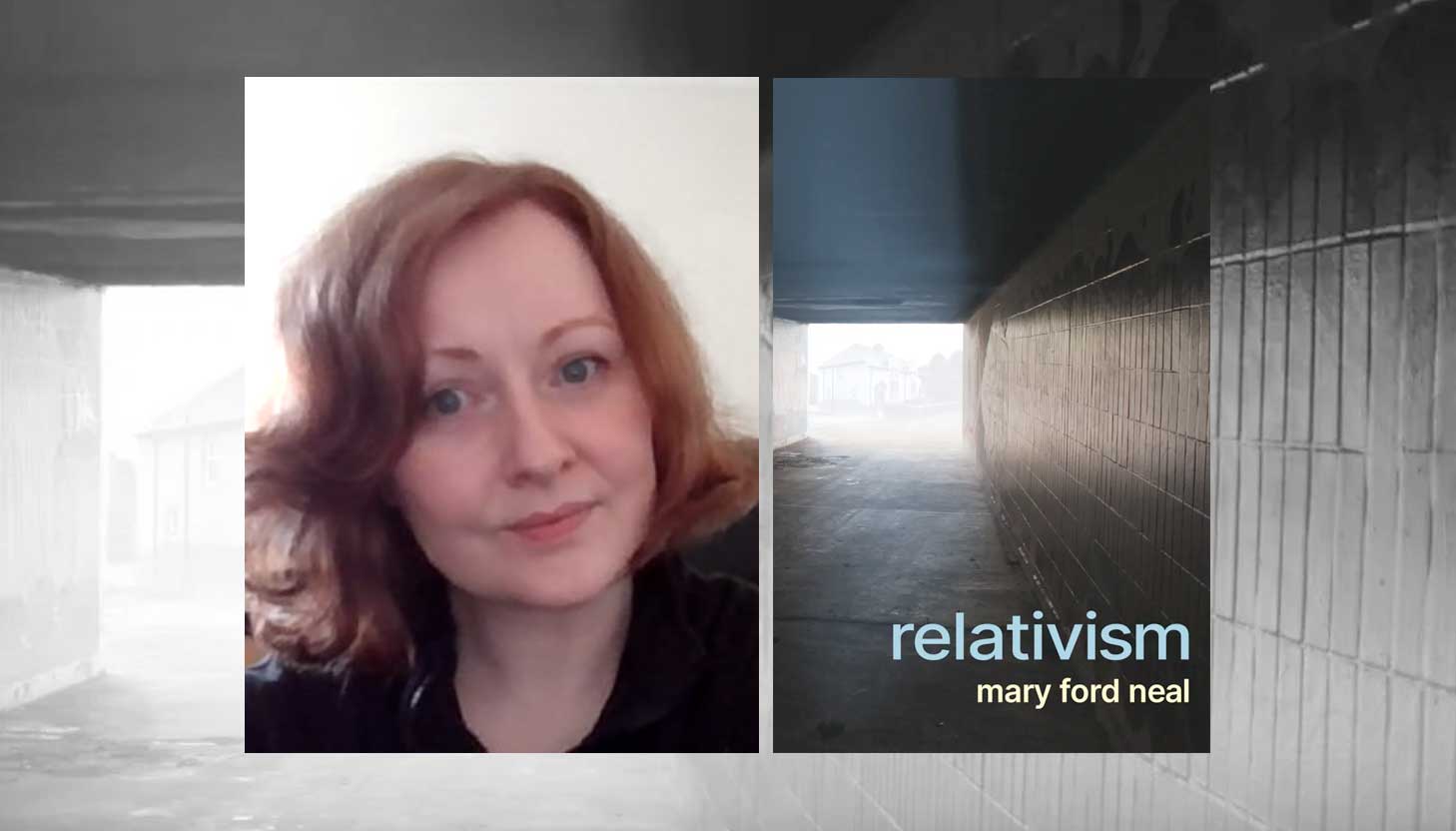Into Books Review: Relativism by Mary Ford Neal

Books: Relativism
Author: Mary Ford Neal
Publisher: Taproot Press
This is a book of relations, in the sense of both relationships and relatives. Mary Ford Neal records and at times celebrates family life and domesticity, without shying away from how confining these can be. But it’s also a book of intellectual roaming, the work of a mind that conceptualises as much as it observes, alert to the moral relativism of our messy but meaningful lives: the poet is, after all, an academic experienced in law and medical ethics.
And then there’s the Neruda-like sensuousness of the everyday, such as the delight the poet takes in seeing, among the shopping, a watermelon ‘that lands on the counter / with a comedy bump / and opens with flamingo fanfare’.
Her observation of people is even keener. How good it must be to have someone in your life who is so appreciatively observant of you that she can conjure your essence in lines such as these:
She plays cards quickly. She smells of cocoa powder or of lilac
and vaporises priests with a raised eyebrow.
She is a raised eyebrow.
No need to italicise that ‘is’: the poet’s voice, clear as a bell, does it for you.
These poems are seldom obscure but they can be many-layered. Take ‘Slow progress’, for instance, which ends (after a series of enigmatic statements), ‘At last, I find a way to burn’. It can mean – not whatever you read into it, but whatever in your own life was slow to catch fire.
There is autobiography, if not confession, in much of the work, but where this ends and imagination begins isn’t clear. If you start off by taking everything at face value as the poet’s lived experience, then you soon realise that this is a life that is too many-sided to make narrative sense. This is a poet capable of ‘being’ other people, but she doesn’t do so in the manner of the Portuguese master, Fernando Pessoa, whose heteronyms were distinct beings: the subjective ‘I’ of these poems feels like the same character, but a character that inhabits different lives, one of these lives being the poet’s own.
Yet there are poems so moving that you feel, rightly or wrongly, that they can’t be fictional. One such is ‘Escapology’, which starts ‘It’s during your third hospitalisation that you take on the look / of someone trapped inside himself’. A certain distance is maintained by twinning the narrative of a husband’s increasingly desperate physical state with a counter-narrative of an escapologist’s trick. The emotion of the poem is like that of the De Profundis – ‘Out of the depths I have cried to thee, O Lord’ – except that the longing is for the surface, for things to be superficial, everyday, again (the surface is the place that the escapologist’s audience’s eyes are trained on, as his reappearance there indicates survival). Equally moving is ‘Husband, this will be hard to hear’ in which the first line follows on from the title, ‘but you’re dead, and I hate your ghost’. It is a poem that is best read, not analysed, and can be found HERE.
‘In expectation of disappointment’ has one of the most arresting openings in a book of arresting openings: ‘I’ve decided not to love you, just in case / you leave like the others’. What follows has the insight of a therapist’s consulting-room without the obfuscatory language of therapy, just the plain-speaking voice of the poet. Sometimes the arresting moment is delayed slightly, as in ‘My mother’s pronoun was not “it”‘:
My mother was iridescent
soft with a sting
and although (naturally) she didn’t have a heart
she loved all 40,000 of us equally.
The mother is a jellyfish, and if this twist seems just a bit too clever, the metaphor doesn’t in fact stray far from the human: ‘I wish you all a mother capable / of giving so much life’.
While remaining accessible, these poems also revel in experiment. ‘Memento’ includes crossed-out lines, as though we are seeing a draft of the poem, with lines excised just as lives are excised by terrorism, which is the poem’s subject. There are also prose poems which read a little like source material for possible non-prose poems, but at least signify that here is a poet who is willing to take risks. There are occasionally echoes of the kind of English surrealism evident in the poems of Hugh Sykes-Davies:
you might be a melting clock but you are
a man with a dog’s head
‘Nine colours of my hometown’ is a deeply impressive sequence, with complex psychology expressed in a coolly detached style that is almost classically simple. And there are the subtly impressive observations that strike you as simple truths you hadn’t formulated for yourself before, such as ‘the heart, like the eye, loves symmetry’.
This ‘writer and academic from the West of Scotland’ is clearly, in her second collection (which, incidentally, has one of the best poetry book covers I’ve seen), an accomplished poet already, but also one whose promise is even clearer to see. What can one hope from a third Mary Ford Neal collection? Personally, I’d hope for fewer poems that would sit comfortably in contemporary poetry journals, and more that are intrinsically, idiosyncratically, inevitably Mary Ford Neal’s.
David Cameron
davidcameronpoet.com
Relativism by Mary Ford Neal is published by Taproot Press





Leave a Reply
You must be logged in to post a comment.